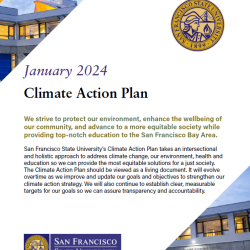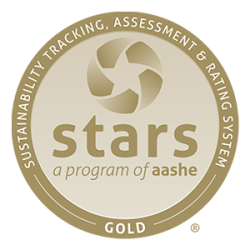Achieving success with our Climate Action Plan requires extensive collaboration between many offices and departments within San Francisco State University and the California State University system. The Climate Action Plan should be viewed as a living document. It will evolve overtime as we improve and update our goals and objectives to strengthen our climate action strategy. We will also continue to establish clear, measurable targets for our goals so we can assure transparency and accountability.
Collaboration
Many departments on campus contribute to developing and implementing our Climate Action Plan.
- Associated Students
- Capital Planning, Design and Construction
- Climate HQ
- Dining Services
- Enterprise Risk Management
- Environmental Resource Center
- Equity & Community Inclusion
- Facilities
- Food+Shelter+Success
- Health Promotion & Wellness
- Office of Emergency Services
- Office of Sustainability
- Parking & Transportation
- San Francisco State University Foundation
- School of the Environment
- Student Success
Coordination
We have several committees on campus comprised of faculty, staff and students to help guide our sustainability decisions.
Climate Justice Leadership Committee:
CJLI was created to cultivate San Francisco State University’s exceptionally diverse students, staff and faculty to become equity-minded climate justice leaders while advancing the economic interests of California. The CJLI is a collaborative, interdisciplinary, campus wide set of initiatives that build student, faculty, staff and community leadership across campus.
All-University Committee on Sustainability:
The All-University Committee on Sustainability will assist the University in monitoring its relationship with the environment and in establishing sustainability as a fundamental consideration in meeting the varied and complex needs of our growing campus. The committee will encourage campus improvements in sustainability by identifying and promoting, as appropriate, private sector and higher education institutional best practices and new sustainability technologies. The committee will work with University administrative, academic and academic support units as well as faculty, students, staff and administrators to stimulate discussion and ideas to facilitate the adoption of practices, policies and projects designed to improve the future environmental, social and economic sustainability of the campus community.
Transportation Demand Management Committee:
The All-University Committee on Sustainability will assist the University in monitoring its relationship with the environment and in establishing sustainability as a fundamental considering with the University’s Sustainability Committee to further the University’s commitment to reducing greenhouse gas emissions related to commuting and other forms of travel, as appropriate; 2) Identifying opportunities to improve pedestrian, bicycling, transit and other non-single occupancy vehicle commute modes and overcome barriers to their use; 3) Establishing goals and strategies in tandem with the TDM plan for reducing carbon emissions related to commuting.
Climate Change Faculty Learning Communities:
Modeled on CEETL’s Teaching Squares, these FLCs will focus on providing space and time for faculty members to discuss and plan around climate justice pedagogy. FLCs l meet regularly throughout the semester to support each other and share best practices for teaching and learning focused on climate justice pedagogies.
Planning
Our new Strategic Plan highlights sustainability and social justice as main tenets for the University, including include increasing classes that incorporate sustainability along with their tracking and advertisement.
SF State has created several plans and guidelines that incorporate sustainability in our campus. Scroll down to view them!
California State University System
Along with the policies SF State creates for itself, we also follow the policies of the California State University system. The CSU have several policies that are required for all 23 campuses of the CSU to follow, including SF State. Many of these policies relate to sustainability such as the Single-Use Plastics Policy which was adopted in December 2018. This policy requires campuses to completely phase out the use of specified single-use plastic waste products -- including plastic straws, single-use plastic bags, single-use polystyrene (e.g. STYROFOAM™) food service items and single-use plastic water bottles -- by January 1st, 2023. THE CSU also has a Sustainability Policy which SF State's climate action goas heavily reflect.
SF State Sustainability Guides
Transportation Demand Management Plan Update 2025
The Transportation Demand Management Plan Update for 2025 outlines a comprehensive strategy to enhance sustainable transportation options, reduce traffic congestion, and improve the overall commuting experience for the SF State community.

Climate Action Plan 2024
SF State's newest Climate Action Plan takes an intersectional and holistic approach to address climate change, our environment, health and education so we can provide the most equitable solutions for a just society.

AASHE STARS Report 2023
SF State participates in the Association for the Advancement of Sustainability in Higher Education's (AASHE) Sustainability, Tracking, Assessment & Rating System (STARS), which is used by more than 900 colleges and universities around the world to benchmark their sustainability efforts. In 2023, SF State earned a Gold rating for the first time and was rated the 3rd highest score in the California State University system.
AASHE STARS Report 2023
| Credit | Status | Points |
|---|---|---|
| Sustainability Coordination (PA-1) | Complete | 1.00 / 1.00 |
| Sustainability Planning (PA-2) | Complete | 3.00 / 4.00 |
| Inclusive and Participatory Governance (PA-3) | Complete | 2.75 / 3.00 |
| Reporting Assurance (PA-4) | Complete | 1.00 / 1.00 |
